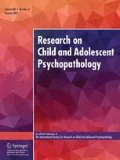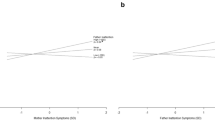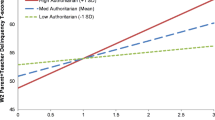Abstract
Hyperactivity, impulsivity, and attention problems (HIA) in children and adolescents are stressful for parents. In this study, we used theories of parents’ perceived power and attributions for youths’ behaviors to develop a model to understand parents’ reactions to their youths’ HIA. We followed 706 youths (376 boys and 330 girls, aged 10–12 years at T1) and their parents in a community-based project over 5 years. Measures of youths’ HIA, youths’ unresponsiveness to correction, parents’ feelings of powerlessness, parental monitoring, and parents’ negative behaviors toward their youths, were used. HIA in youths predicted increases in parents’ perceptions that their youths were unresponsive to correction, which in turn prompted parents to feel more powerless over time. Further, parents’ feelings of powerlessness were associated with increases in negative parenting behaviors over time. These results indicate a movement to more negative parenting practices over time as a result of youths’ HIA.



Similar content being viewed by others
References
Andershed, H., Kerr, M., Stattin, H., & Levander, S. (2002). Psychopathic traits in non-referred youths: Initial test of a new assessment tool. In E. Blaauw & L. Sheridan (Eds.), Psychopaths. Current international perspectives (pp. 131–158). The Hague: Elsevier.
Arnold, E. H., O’Leary, S. G., & Edwards, G. H. (1997). Father involvement and self-reported parenting of children with attention deficit-hyperactivity disorder. Journal of Consulting and Clinical Psychology, 65, 337–342. doi:10.1037/0022-006X.65.2.337.
Baker, D. B. (1994). Parenting stress and ADHD: a comparison of mothers and fathers. Journal of Emotional and Behavioral Disorders, 2, 46–50. doi:10.1177/106342669400200106.
Barkley, R. A. (1999). Theories of attention-deficit/hyperactivity disorder. In H. Quay & A. Hogan (Eds.), Handbook of disruptive behavior disorders (pp. 295–313). New York: Kluwer Academic / Plenum.
Barkley, R. A., Fischer, M., Edelbrock, C., & Smallish, L. (1991). The adolescent outcome of hyperactive children diagnosed by research criteria—III. Mother-child interactions, family conflicts and maternal psychopathology. Journal of Child Psycholology and Psychiatry, 32, 233–255. doi:10.1111/j.1469-7610.1991.tb00304.x.
Barkley, R. A., Anastopoulos, A. D., Guevremont, D. C., & Fletcher, K. E. (1992). Adolescents with attention deficit hyperactivity disorder: mother-adolescent interactions, family beliefs and conflicts, and maternal psychopathology. Journal of Abnormal Child Psychology, 20, 263–288. doi:10.1007/BF00916692.
Barkley, R. A., Fischer, M., Smallish, L., & Fletcher, K. (2002). The persistence of attention-deficit/hyperactivity disorder into young adulthood as a function of reporting source and definition of disorder. Journal of Abnormal Psychology, 111, 279–289. doi:10.1037/0021-843X.111.2.279.
Befera, M. S., & Barkley, R. A. (1985). Hyperactive and normal girls and boys: mother-child interaction, parent psychiatric status and child psychopathology. Journal of Child Psychology and Psychiatry, 26, 439–452. doi:10.1111/j.1469-7610.1985.tb01945.x.
Bentler, P. M. (1990). Comparative fit indexes in structural models. Psychological Bulletin, 107, 238–246. doi:10.1037/0033-2909.107.2.238.
Biederman, J., Faraone, S. V., Keenan, K., Knee, D., & Tsuang, M. T. (1990). Family-genetic and psychosocial risk factors in DSM-III attention deficit disorder. Journal of the Academy of Child & Adolescent Psychiatry, 29, 526–533. doi:10.1097/00004583-199007000-00004.
Breen, M. J., & Barkley, R. A. (1988). Child psychopathology and parenting stress in girls and boys having attention deficit disorder with hyperactivity. Journal of Pediatric Psychology, 13, 265–280. doi:10.1093/jpepsy/13.2.265.
Brown, R. T., & Pacini, J. N. (1989). Perceived family functioning, marital status, and depression in parents of boys with attention deficit disorder. Journal of Learning Disabilities, 22, 581–587. doi:10.1177/002221948902200911.
Browne, M. W., & Cudeck, R. (1993). Alternative ways of assessing model fit. In K. A. Bollen & S. J. Long (Eds.), Testing structural equation models (pp. 136–162). Newbury Park: Sage.
Bugental, D. B., & Shennum, W. A. (1984). “Difficult” children as elicitors and targets of adult communication patterns: an attributional- behavioral transactional analysis. with commentary by Philip Shaver; with reply by Daphne Blunt Bugental and William A. Shennum [Monograph]. Monographs of the Society for Research in Child Development, 49(1, Serial No. 205), 79–160. doi:10.2307/1165910.
Bugental, D. B., Blue, J., & Cruzcosa, M. (1989a). Perceived control over caregiving outcomes: Implications for child abuse. Developmental Psychology, 25, 532–539. doi:10.1037/0012-1649.25.4.532.
Bugental, D. B., Mantyla, S. M., & Lewis, J. (1989b). Parental attributions as moderators of affective communication to children at risk for physical abuse. In D. Cicchetti & V. Carlson (Eds.), Child maltreatment. Theory and research on the causes and consequences of child abuse and neglect. Cambridge: Cambridge University Press.
Bugental, D. B., Lewis, J. C., Lin, E., Lyon, J., & Kopeikin, H. (1999). In charge but not in control: the management of teaching relationships by adults with low perceived power. Developmental Psychology, 35, 1367–1378. doi:10.1037/0012-1649.35.6.1367.
Burke, J. D., Pardini, D. A., & Loeber, R. (2008). Reciprocal relationships between parenting behavior and disruptive psychopathology from childhood through adolescence. Journal of Abnormal Child Psychology, 36(5), 679–692. doi:10.1007/s10802-008-9219-7.
Bussing, R., Fernandez, M., Harwood, M., Hou, W., Garvan, C. W., Eyberg, S. M., et al. (2008). Parent and teacher SNAP-IV ratings of attention deficit hyperactivity disorder symptoms: psychometric properties and normative ratings from a school district sample. Assessment, 15, 317–328. doi:10.1177/1073191107313888.
Cunningham, C. E., Benness, B. B., & Siegel, L. S. (1988). Family functioning, time allocation, and parental depression in the families of normal and ADDH children. Journal of Clinical Child Psychology, 17, 169–177. doi:10.1207/s15374424jccp1702_10.
Deault, L. C. (2010). A systematic review of parenting in relation to the development of comorbidities and functional impairments in children with attention-deficits/hyperactivity disorder (ADHD). Child Psychiatry and Human Development, 41, 168–192. doi:10.1007/s10578-009-0159-4.
Edel, M.-A., Juckel, G., & Brüne, M. (2010). Interaction of recalled parental ADHD symptoms and rearing behavior with current attachment and emotional dysfunction in adult offspring with ADHD. Psychiatry Research, 178, 137–141. doi:10.1016/j.psychres.2010.04.004.
Faraone, S. V., Biederman, J., & Milberg, S. (1994). An exploratory study of ADHD among second-degree relatives of ADHD children. Biological Psychiatry, 35, 398–402. doi:10.1016/0006-3223(94)90006-x.
Hafen, C. A., & Laursen, B. (2009). More problems and less support: early adolescent adjustment forecasts changes in perceived support from parents. Journal of Family Psychology, 23, 193–202. doi:10.1037/a0015077.
Hartung, C. M., McCarthy, D. M., Milich, R., & Martin, C. A. (2005). Parent-adolescent agreement on disruptive behavior symptoms: a multitrait-multimethod model. Journal of Psychopathology and Behavioral Assessment, 27, 159–168. doi:10.1007/s10862-005-0632-8.
Harvey, E., Danforth, J. S., McKee, T. E., Ulaszek, W. R., & Friedman, J. L. (2003). Parenting of children with attention-deficit/hyperactivity disorder (ADHD): the role of parental ADHD symptomatology. Journal of Attention Disorders, 7, 31–42. doi:10.1177/108705470300700104.
Hinde, R. A., & Stevenson-Hinde, J. (1987). Interpersonal relationships and child development. Developmental Review, 7, 1–21. doi:10.1016/0273-2297(87)90002-5.
Hu, L., & Bentler, P. M. (1999). Cutoff criteria for fit indexes in covariance structure analysis: conventional criteria versus new alternatives. Structural Equation Modeling, 6(1), 1–55. doi:10.1080/10705519909540118.
Huh, D., Tristan, J., Wade, E., & Stice, E. (2006). Does problem behavior elicit poor parenting? A prospective study of adolescent girls. Journal of Adolescent Research, 21, 185–204. doi:10.1177/0743558405285462.
Johnson, J. H., & Reader, S. K. (2002). Assessing stress in families of children with ADHD: preliminary development of the disruptive behavior stress inventory (DBSI). Journal of Clinical Psychology in Medical Settings, 9, 51–62. doi:10.1023/A:1014136029697.
Johnston, C., & Mash, E. J. (2001). Families of children with attention-deficit/ hyperactivity disorder: review and recommendations for future research. Clinical Child and Family Psychology Review, 4, 183–207. doi:10.1023/a:1017592030434.
Johnston, C., Chen, M., & Ohan, J. (2006). Mothers’ attributions for behavior in nonproblem boys, boys with attention deficit hyperactivity disorder, and boys with attention hyperactivity disorder and oppositional defiant behaviors. Journal of Clinical Child and Adolescent Psychology, 35, 60–71. doi:10.1207/s15374424jccp3501_6.
Kashdan, T. B., Jacob, R. G., Pelham, W. E., Lang, A. R., Hoza, B., Blumenthal, J. D., et al. (2004). Depression and anxiety in parents of children with ADHD and varying levels of oppositional defiant behaviors: modeling relationships with family functioning. Journal of Clinical Child and Adolescent Psychology, 33, 169–181. doi:10.1207/S15374424JCCP3301_16.
Kerr, M., & Stattin, H. (2000). What parents know, how they know it, and several forms of adolescent adjustment: further support for a reinterpretation of monitoring. Developmental Psychology, 36, 366–380. doi:10.1037/0012-1649.36.3.366.
Kerr, M., & Stattin, H. (2003). Parenting of adolescents: Action or reaction? In A. C. Crouter & A. Booth (Eds.), Children’s influence on family dynamics: The neglected side of family relationships (pp. 121–151). Mahwah: Lawrence Erlbaum Associates.
Kerr, M., Stattin, H., & Trost, K. (1999). To know you is to trust you: parents’ trust is rooted in child disclosure of information. Journal of Adolescence, 22, 737–752. doi:10.1006/jado.1999.0266.
Kerr, M., Stattin, H., & Pakalniskiene, V. (2008). Parents react to adolescent problem behaviors by worrying more and monitoring less. In M. Kerr, H. Stattin, & R. Engels (Eds.), What can parents do? New insights into the role of parents in adolescent problem behavior (pp. 91–112). West Sussex: Wiley.
Kuczynski, L. (2003). Beyond bidirectionality: Bilateral conceptual frameworks for understanding dynamics in parent-child relations. In L. Kuczynski (Ed.), Handbook of dynamics in parent-child relations (pp. 3–24). Thousand Oaks: Sage.
Lange, G., Sheerin, D., Carr, A., Dooley, B., Barton, V., Marshall, D., et al. (2005). Family factors associated with attention deficit hyperactivity disorder and emotional disorders in children. Journal of Family Therapy, 27, 76–96. doi:10.1111/j.1467-6427.2005.00300.x.
Lifford, K. J., Harold, G. T., & Thapar, A. (2008). Parent-child relationships and ADHD symptoms: a longitudinal analysis. Journal of Abnormal Child Psychology, 36, 285–296. doi:10.1007/s10802-007-9177-5.
Lifford, K. J., Harold, G. T., & Thapar, A. (2009). Parent-child hostility and child ADHD symptoms: a genetically sensitive and longitudinal analysis. Journal of Child Psychology and Psychiatry, 50, 1468–1476. doi:10.1111/j.1469-7610.2009.02107.x.
Lollis, S. (2003). Conceptualizing the influence of the past and the future in present parent-child relationships. In L. Kuczynski (Ed.), Handbook of dynamics in parent-child relations (pp. 67–88). Thousand Oaks: Sage.
Lollis, S., & Kuczynski, L. (1997). Beyond one hand clapping: seeing bidirectionality in parent-child relations. Journal of Social and Personal Relationships, 14, 441–461. doi:10.1177/0265407597144002.
Luman, M., Oosterlaan, J., & Sergeant, J. A. (2005). The impact of reinforcement contingencies on AD/HD: a review and theoretical appraisal. Clinical Psychology Review, 25, 183–213. doi:10.1016/j.cpr.2004.11.001.
Mash, E. J., & Johnston, C. (1983). Parental perceptions of child behavior problems, parenting self-esteem, and mothers’ reported stress in younger and older hyperactive and normal children. Journal of Consulting and Clinical Psychology, 51, 86–99. doi:10.1037/0022-006x.51.1.86.
Morsbach, S. K., & Prinz, R. J. (2006). Understanding and improving the validity of self-report of parenting. Clinical Child and Family Psychology Review, 9, 1–21. doi:10.1007/s10567-006-0001-5.
Muthén, B. O., & Muthén, L. K. (1998–2006). Mplus user’s guide (5th ed.). Los Angeles: Muthén & Muthén.
Persson, S., Stattin, H., & Kerr, M. (2004). Adolescents’ conceptions of family democracy: does their own behavior play a role? The European Journal of Developmental Psychology, 1, 317–330. doi:10.1080/17405620444000238.
Podolski, C.-L., & Nigg, J. T. (2001). Parent stress and coping in relation to child ADHD severity and associated child disruptive behavior problems. Journal of Clinical Child Psychology, 30, 503–513. doi:10.1207/S15374424JCCP3004_07.
Quay, H. C. (1988). The behavioral reward and inhibition system in childhood behavior disorder. In L. M. Bloomingdale (Ed.), Attention deficit disorder: New research in attention, treatment, and psychopharmacology (pp. 176–186). Oxford: Pergamon.
Quay, H. C. (1997). Inhibition and attention deficit hyperactivity disorder. Journal of Abnormal Child Psychology, 25, 7–13. doi:10.1023/A:1025799122529.
Reader, S. K., Stewart, L. M., & Johnson, J. H. (2009). Assessing ADHD-related family stressors with the Disruptive Behavior Stress Inventory (DBSI): a replication and extension. Journal of Clinical Psychology in Medical Settings, 16, 148–160. doi:10.1007/s10880-008-9140-9.
Schroeder, V. M., & Kelley, M. L. (2009). Associations between family environment, parenting practices, and executive functioning of children with and without ADHD. Journal of Child and Family Studies, 18, 227–235. doi:10.1007/s10826-008-9223-0.
Seipp, C. M., & Jonston, C. (2005). Mother-son interactions in families of boys with attentio-deficit/hyperactivity disorder with and without oppositional behavior. Journal of Abnormal Child Psychology, 33, 87–98. doi:10.1007/s10802-005-0936-x.
Shrout, P. E., & Bolger, N. (2002). Mediation in experimental and nonexperimental studies: new procedures and recommendations. Psychological Methods, 7, 422–445. doi:10.1037/1082-989X.7.4.422.
Stice, E., & Barrera, M. (1995). A longitudinal examination of the reciprocal relations between perceived parenting and adolescents’ substance use and externalizing behaviors. Developmental Psychology, 31, 322–334. doi:10.1037/0012-1649.31.2.322.
Swanson, J. M., Kraemer, H. C., Hinshaw, S. P., Arnold, L. E., Conners, C. K., Abikoff, H. B., et al. (2001). Clinical relevance of the primary findings of the MTA: Success rates based on severity of ADHD and ODD symptoms at the end of treatment. Journal of the American Academy of Child & Adolescents Psychiatry, 40, 168–179. doi:10.1097/00004583-200102000-00011.
Tilton-Weaver, L., Kerr, M., Pakalniskeine, V., Tokic, A., Salihovic, S., & Stattin, H. (2010). Open up or close down: how do parental reactions affect youth information management? Journal of Adolescence, 33(2), 333–346. doi:10.1016/j.adolescence.2009.07.011.
Whalen, C. K., Henker, B., Jamner, L. D., Ishikawa, S. S., Floro, J. N., Swindle, R., et al. (2006). Toward mapping daily challenges of living with ADHD: maternal and child perspectives using electronic diaries. Journal of Abnormal Child Psychology, 34, 115–130. doi:10.1007/s10802-005-9008-5.
Author information
Authors and Affiliations
Corresponding author
Additional information
This research was supported by a grant to Margaret Kerr and Håkan Stattin from the Swedish Research Council.
Rights and permissions
About this article
Cite this article
Glatz, T., Stattin, H. & Kerr, M. Parents’ Reactions to Youths’ Hyperactivity, Impulsivity, and Attention Problems. J Abnorm Child Psychol 39, 1125–1135 (2011). https://doi.org/10.1007/s10802-011-9541-3
Published:
Issue Date:
DOI: https://doi.org/10.1007/s10802-011-9541-3




